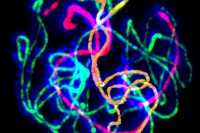High temperatures affect male fertility in plants

Nucleus of a cell that is undergoing meiosis at high temperature.
04 February 2014
Scientists at Aberystwyth University’s IBERS have identified a protein that is essential for male fertility in plants that grow in high temperatures.
This has potentially significant implications in the race to provide enough food for a growing population in the light of climate change.
The research paper is published in PNAS (Proceedings of the National Academy of Sciences of the United States of America) and is funded by the BBSRC and the European Union FP7 programme.
In human males the temperature of reproductive organs can have an adverse effect on fertility, and in this study the same appears to be true in plants.
A relatively small change in temperature can strongly affect the ability of many crops to produce seed.
Professor John Doonan, Director of the National Plant Phenomics Centre at IBERS said; “The protein could also have a crucial role to play in plant breeding. Plant breeding depends on the mixing of genetic material from both parents. This mixing is known as recombination, which results in offspring taking on characteristics from both parents to form a new variety.
“Plant breeders would like to be able to manipulate the level of recombination to facilitate breeding characteristics into crops, particularly wheat and other cereals.”
Bread wheat is a species that has arisen due to the crossing of three ancestral plants, and it therefore contains three genomes (the full complement of genetic material within an organism) that are very similar, and can potentially recombine with each other.
Understanding the mechanisms that prevent these three genomes mixing with one another while allowing recombination within parental genomes is very important for breeding new varieties of wheat. Breeders would like to be able to cross bread wheat with its wild relatives to introduce new characteristics.
A mutation occurs when a DNA gene is damaged or changed in such a way as to alter the genetic message carried by that gene, and several decades ago, a mutation was identified in bread wheat called ph1 by geneticists at the Plant Breeding Institute in Cambridge, which allowed recombination between the genomes of wild species and domesticated wheat.
Generally, this is a bad thing as it also allows the three parental genomes of bread wheat to recombine at the same time, and leads to reduced fertility and low yields. In theory, breeders can exploit this during breeding programmes, but at the expense of time and effort to bring ph1 into the breeding lines and then get rid of it again.
The Aberystwyth team has identified a gene closely related to ph1 in the model plant, Arabidopsis – sometimes referred to as the lab rat of plant science- and has shown that this gene controls chromosome pairing and recombination.
Because Arabidopsis is amenable to experimentation, this holds the promise of understanding the properties of these proteins and developing new ways to manipulate their activity during wheat breeding programmes.
This has the potential to accelerate the rate at which valuable traits can be transferred from wild species into domesticated bread wheat and this could potentially have significant applications given the immediacy of climate change and the daunting challenges of food security.



